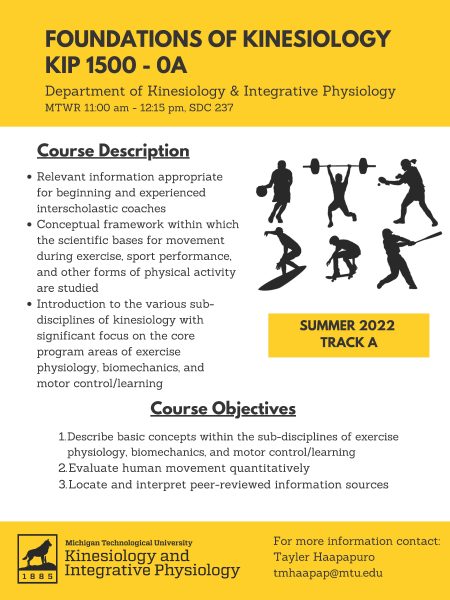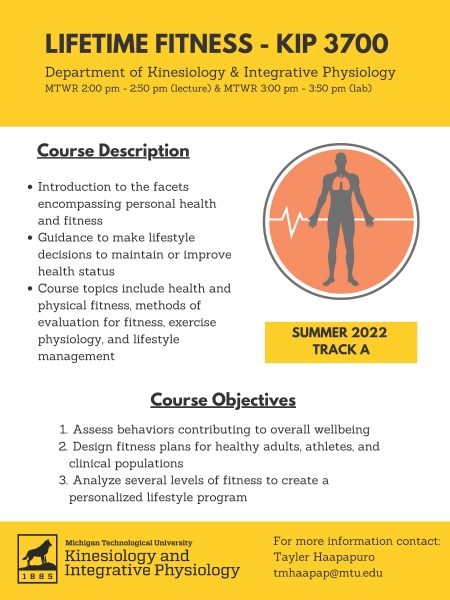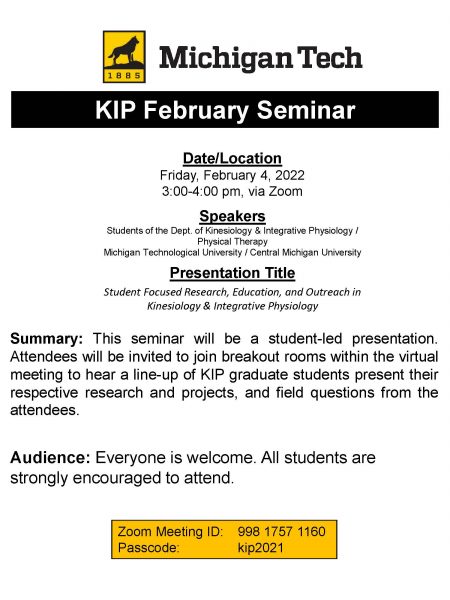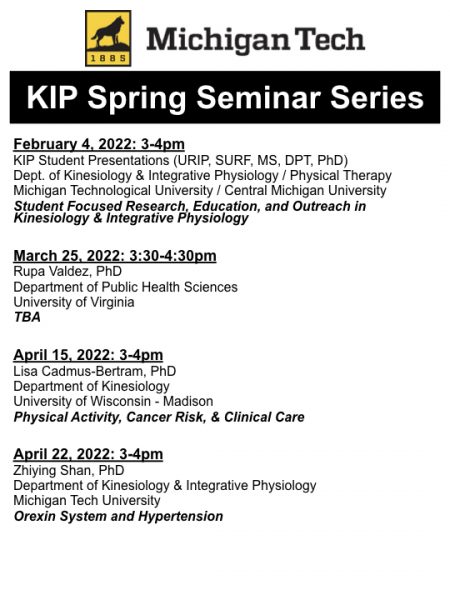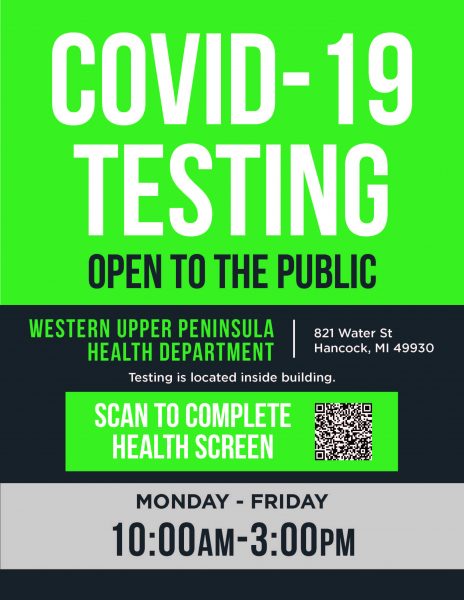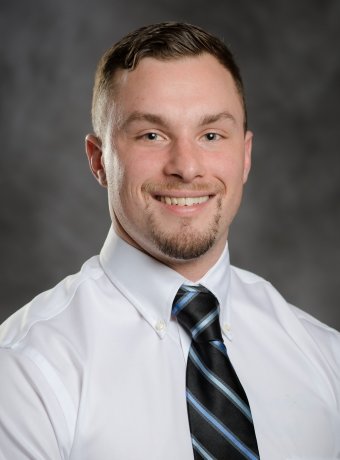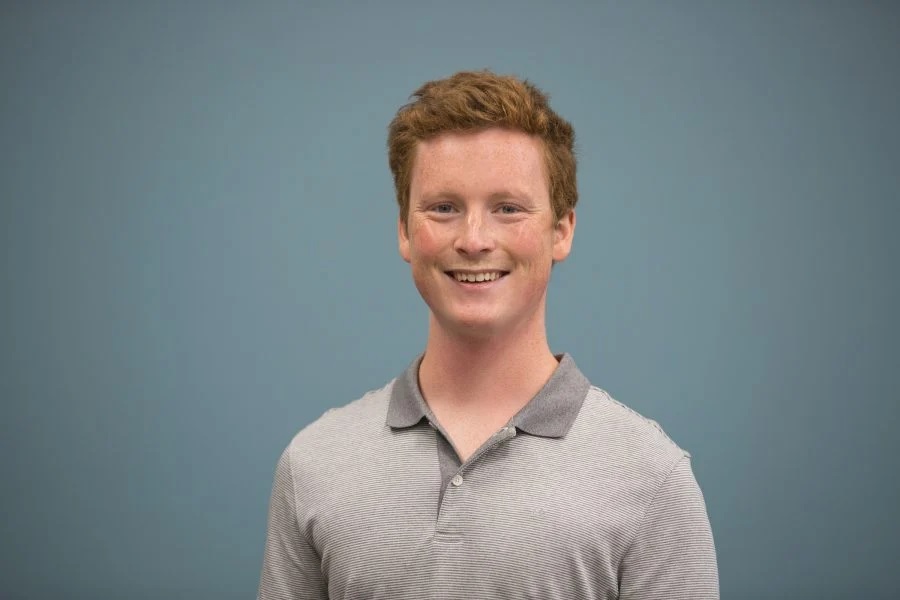Michigan Tech University is one of only 156 universities and colleges around the world to be honored by Exercise is Medicine® for its efforts to create a culture of wellness on campus. Michigan Tech’s “UP and Moving” Program housed in the Department of Kinesiology and Integrative Physiology played a large part in helping the university to earn a silver level designation from the Exercise is Medicine® On Campus (EIM-OC) program. The University also increased awareness of the health benefits of physical activity through a series of public seminars and town hall presentations.
“We are thrilled to recognize these campuses’ commitment to make movement a part of daily campus culture and equip students with tools to cultivate lifelong physical activity habits, especially during the COVID-19 pandemic,” said Robyn Stuhr, vice president of Exercise is Medicine. “These campus programs are nurturing future leaders who will advance a key tenet of Exercise is Medicine: making physical activity assessment and promotion a standard in health care.”
For substantial health benefits, the U.S. Department of Health and Human Services recommends that adults engage in at least 150 min of moderate-to-vigorous intensity physical activity each week and limit the amount of time spent sitting. To facilitate physical activity on campus and in the community, the UP and Moving program offers free virtual home-based workouts to keep students, staff, faculty, and community members active. Steven Elmer, Associate Professor in the Department of Kinesiology and Integrative Physiology, emphasized, “Engaging in regular physical activity promotes good physical and mental health, improves quality of life, and reduces risk for chronic conditions such as heart disease and type 2 diabetes. Importantly, regular physical activity also lowers risk for severe COVID-19 outcomes.”
The home-based workouts do not require any specialized equipment and are easily adapted to fit a wide range of ages and ability levels. Workouts are led by a team of graduate students (Isaac Wedig, Carmen Scarfone, Isaac Lennox) at Michigan Tech and range from muscle strengthening exercise (i.e., weightlifting) to aerobic exercise (i.e., walking) to yoga and everything in between. The live workouts are also recorded and available to watch anytime on the program’s website and YouTube Channel. “Moving forward, the UP and Moving program at Michigan Tech aims to partner with local health care providers to establish physical activity as a health vital sign,” explained Isaac Lennox, a master’s student in Kinesiology.
Of the 153 campuses recognized this year, 73 received gold, 60 silver and 23 bronze. All gold, silver and bronze universities and colleges will be officially recognized on June 1 as part of the 2022 Exercise is Medicine World Congress, held in conjunction with the American College of Sports Medicine’s Annual Meeting. Professor William Cooke, ACSM Fellow and Acting Chair of the Department of Kinesiology & Integrative Physiology at Michigan Tech, said, “faculty and students in our department were instrumental in educating both university and community members about the necessity of activity during the worst of the pandemic. The positive response we received from their outreach efforts was overwhelming.”
EIM-OC calls upon universities and colleges to promote physical activity as a vital sign of health and encourages faculty, staff, and students to work together to improve the health and well-being of the campus community. EIM-OC launched its recognition program in 2014 to honor campuses for their efforts to create a culture of wellness. Schools earn gold, silver or bronze status based on their activities. Gold level campuses have created a referral system where campus health care providers assess students’ physical activity and refer students as necessary to a certified fitness professional as part of medical treatment. Silver campuses engage students, faculty and staff in education initiatives and make movement part of the daily campus culture while bronze level campuses promote and generate awareness of the health benefits of physical activity.
View a complete list of EIM-OC recognized schools at the Exercise is Medicine website and learn more about the UP and Moving program at UP and Moving’s website.
About Exercise Is Medicine
The American College of Sports Medicine (ACSM) co-launched Exercise is Medicine® (EIM) in 2007 with the American Medical Association. ACSM continues to manage the global health initiative, which seeks to make physical activity assessment and promotion a standard in clinical care, connecting health care with evidence-based physical activity resources for people everywhere of all abilities. EIM is committed to the belief that physical activity promotes optimal health, is integral in the prevention and treatment of many medical conditions and should be regularly assessed and included as part of health care. Visit www.ExerciseisMedicine.org for additional information.
About the American College of Sports Medicine
The American College of Sports Medicine is the largest sports medicine and exercise science organization in the world. More than 50,000 international, national and regional members and certified professionals are dedicated to advancing and integrating scientific research to provide educational and practical applications of exercise science and sports medicine. More details at www.acsm.org

